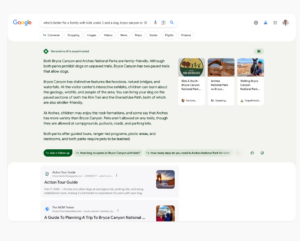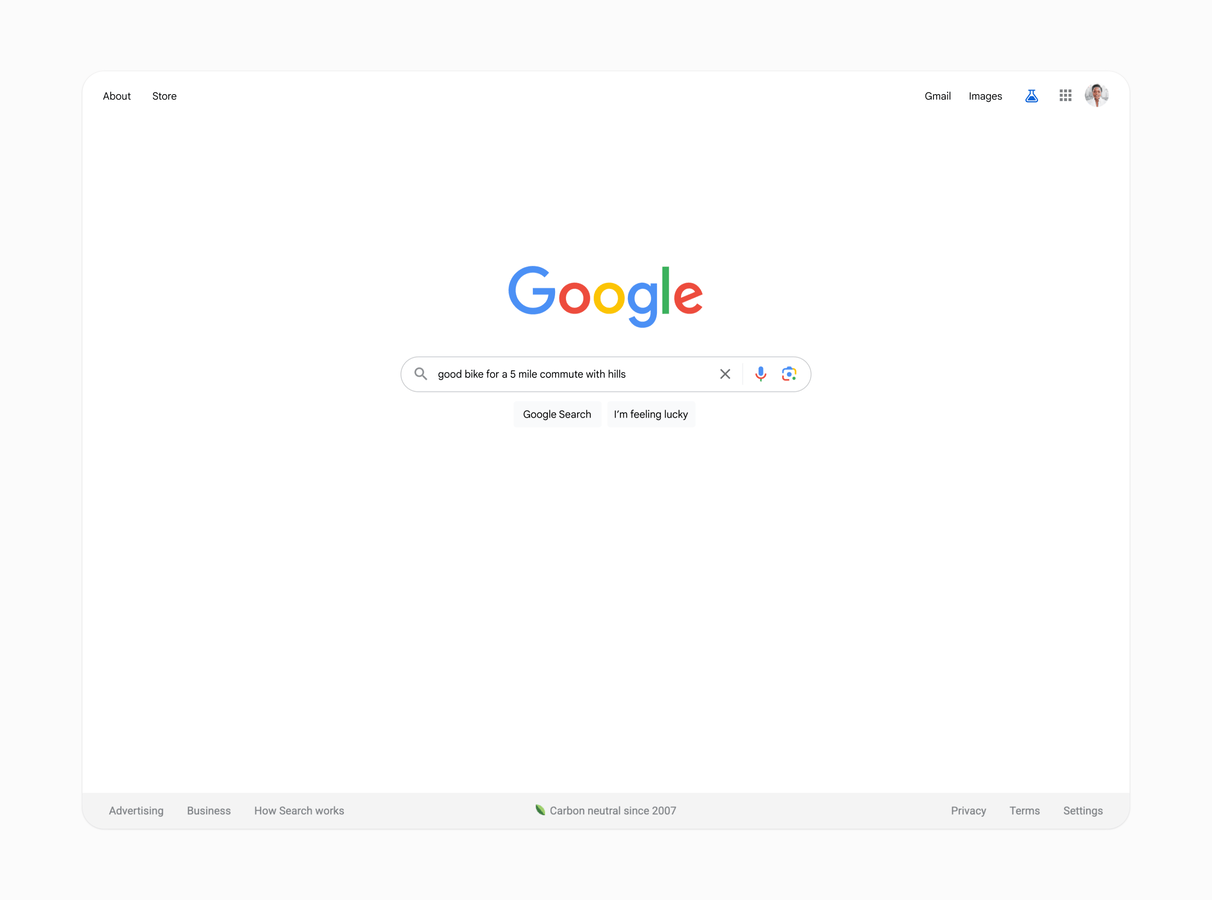Google’s annual I/O event concluded earlier this, and the tech. giant has unveiled several new advancements in Search, Google Ads, visual creation elements, and more. The buzzword at this year’s event was – yes, you guessed it – AI. Google has been using AI for search for a long time now, but with the rapid growth in AI technology, and specifically the popularity of ChatGPT, the company aims to leverage generative AI directly in Google Search.
Generative AI in Search
The biggest product update unveiled at the event was the Search Generative Experience – a fresh look at how Google could take a long-tail search query and present users with customized responses based on the query. Users will also have the option to ask follow-up questions to refine their answers by tapping the ‘Ask a follow-up’ prompt. It appears that the day isn’t far when in the marketing world ‘search queries’ will be replaced by ‘search prompts’ creating a more conversational search experience. An example of a query that was demoed at the event was “What’s better for a family with kids under 3 and a dog, Bryce canyon or Arches.” Now, this query can easily be broken down into a few smaller queries leading to multiple search results, leaving the user piecing together all the information. But with the new search experience, you could see an ‘AI snapshot’ of an answer from Google along with “key information to consider, with links to dig deeper,” according to Google.

Google’s generative AI tools will also be expanded to shopping results, assisting users in making product comparisons. The AI-powered shopping experience will provide insights, including product descriptions with relevant reviews, ratings, prices, and images. This feature is built on Google’s comprehensive dataset, the Shopping Graph, which currently contains over 35 billion product listings.
SEO implication: E-commerce websites will need to have clear product descriptions, quick inventory refreshes, fast loading websites and showcase first-hand reviews for increasing their chances of appearing in product-focused searches.
Organic traffic to websites is bound to drop, especially for informational queries
Google is attempting to reduce the number of clicks it currently takes a user to get a definitive answer to their queries. Instead of listing the best possible websites for your queries, the new product update will organize and present information from a bunch of websites (the demo listed three websites as the source of information along with the search result).
Over the last few years there has been a tremendous amount of talk about the rise of zero-click searches. These are the searches that result in no click to a website as Google displays the answer directly on the results page itself, leading to a drop in organic traffic. With generative AI, answers on the results page will be the norm. In fact, Forbes, in a recent article suggested that modern SEO is turning into AEO (Answer Engine Optimization).
E-E-A-T will continue to be massive
While Google seems to have taken a responsible and deliberate approach, it acknowledged that errors can occur in AI-generated answers. Google, intentionally seems to be a little slow to deliver AI-generated answers to queries that belong to the YMYL (‘Your Money or Your Life’) bucket. These are the searches that involve medical advice and monetary transactions This was confirmed by a senior executive at Google Search who said that Google won’t give you answers for everything. You might not see answers appear for queries where “information is critically important.”
SEO implication: Google will have greater focus on content with unique expertise and experience. It aims to rank more useful information created from a personal or expert point of view, building on E-E-A-T (Experience, Expertise, Authority and Trustworthiness). Brands in a particular niche will do well to leverage and highlight research-backed information, expert opinions, author bios, etc. on their websites. Needless to say, research universities like ours could take advantage of this.
Shift toward multimedia optimization
A new addition called “Perspectives” will provide more human insights into specific elements of selected search results. Users will have access to long and short-form videos, images, and written posts shared on discussion boards, Q&A sites, and social media platforms. Google will provide more details about content creators, enhancing the context of the shared content.
SEO implication: With the introduction of Google Perspectives, we could expect a lot more multimedia and more human faces in search results. Google is watching the rise of authentic short-form video content (read TikTok) as the go-to ‘search and discovery’ platform, so we could expect to see many more mixed-media results being pulled from social platforms such as YouTube Shorts, TikTok, Reddit, Quora, etc.
Brands will likely need to have a robust presence across a gamut of social platforms. This would mean not only being present, but actively covering the spectrum of searches around your brand with optimized content.
Other updates
Google executives stressed keeping the distinction between search ads and organic results. Ads will continue to appear in dedicated slots throughout the page.
Google is also expanding the availability of its generative AI creation tool, Bard, to more regions. It is also adding more capacity to generate Bard responses from multiple inputs, such as incorporating images into queries. They also maintained that Bard will be separate from the Search Generative Experience.
Enhancements to Google’s photo editing tools are also on the horizon. The Magic Editor, utilizing a combination of AI techniques, including generative AI, will provide users with more control over specific parts of an image, such as the subject, sky, or background.
To address the risks associated with generative AI images in Search, Google is introducing new informational tools. The “About this image” feature will offer users context about the image’s origins, including news updates and relevant information about potential fakes. Google will also label AI-generated images in Search, where possible, including those generated by its own AI tools like Bard.
Even with the AI revolution, the basics of SEO should remain the same – create unique, engaging content; cover search intent from various angles; have fast loading sites; showcase your expertise.
